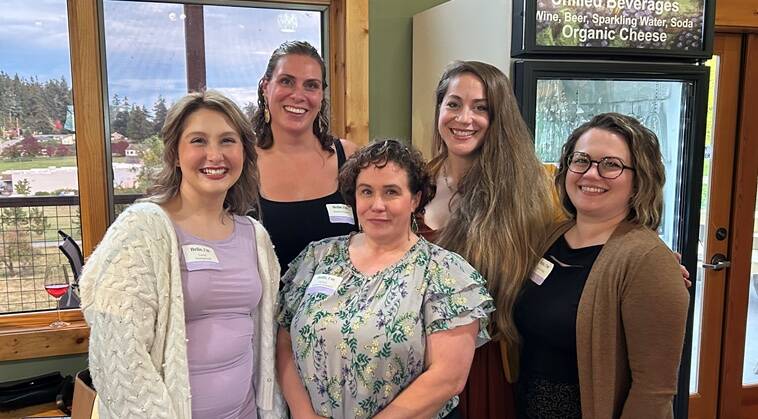Behind closed doors in an Oak Harbor apartment, Chanell Saddler suffered at the hands of her husband over many months, perhaps much longer, prosecutors allege.
The police were called to the apartment four times in nine months, but each time she denied being abused. Her son would later tell police that he knew something violent had been happening in his parents’ bedroom. On Oct. 7, the final time police responded, the boy discovered his mother’s broken body in her bed. His father was arrested and charged with murder.
While the tragic death of Chanell Saddler has brought the issue of domestic violence into the forefront of public consciousness on Whidbey Island — during what happens to be Domestic Violence Awareness Month — advocates want to remind the community that non-judgmental, comprehensive help is available.
Andrea Downs, the executive director of Citizens Against Domestic and Sexual Abuse, said the county’s only domestic abuse support agency can help provide housing, court-ordered protection, counseling and many other services for survivors of domestic and sexual assault. The group runs a 24-hour help line, helps clients create safety plans, maintains a shelter and works to prevent violence through a program at schools and an awareness campaign.
“Part of the solution is to build a community that doesn’t hide from the conversation,” Downs said. “If you know your community is going to believe you, is going to listen and support you, then you are more likely to seek help.”
In fact, Downs said the nonprofit organization is going through a period of regeneration and reenergizing following some difficult years. During COVID, the group had staff turnover that worried leaders in the law-and-justice community.
But at the beginning of the year, the nonprofit’s board hired Downs, who has a background in education and administration; along with being a South Whidbey School Board member, she was most recently the assistant director of special programs for the Northwest Educational Service District.
Downs is working to raise the profile of CADA in the community. She explained that CADA has a longtime office in Oak Harbor, and she opened a second office in Langley in order to make access easier for people who live on the South End. She plans to hire a sixth staff member in November. She is working to build support and a higher profile in the community with events like a recent Sip and Share.
Downs emphasized that her staff and the prior director of CADA have been instrumental in helping her learn on the job.
Yet much of the work that CADA does, Downs said, is not seen by the public, although the need is great.
From July 1, 2023 to June 30, 2024, CADA’s 24/7 hotline received 316 calls related to domestic violence and five calls related to sexual assault.
During that same period, the group provided emergency shelter to 17 families as well as five interim hotel vouchers and alternative accommodations in two cases. CADA’s shelter, located at a safe, undisclosed site, is continuously at capacity and provides food, household supplies and other services.
One of the challenges, Downs said, is that only women and children can be placed in the shelter, which can make it difficult to find housing for adult male victims of domestic violence.
With an ongoing housing crisis in the community and beyond, it’s perhaps not surprising that finding people places to live is often key to helping them escape domestic violence, Downs said. The agency’s grant funding requires clients to have a longer-term plan in place to receive help for housing, which can be a challenge when the options are few, she said.
In the first eight months of the year, CADA provided client consultations to 11 people and legal advocacy to 10 clients. The work can include helping clients obtain protection orders and assisting with other court-related preparations.
In fact, Downs explained that much of what advocates do is to help people navigate services from myriad agencies, from counseling services to the county housing program to Navy services and beyond.
Downs emphasized that CADA services are client-driven, which means people are not pressured to take any specific actions. The group’s relationship with law enforcement is vital to its success. While CADA doesn’t go to the scenes of violence, officers who respond to suspected domestic-violence incidents provide victims with contact information for CADA.
Sadly, not everyone who needs help reaches out. Domestic violence cases continue to fill the dockets in both Island County superior and district courts. One of the most common felony crimes in the county is assault in the second degree, which is a statute created to address the significant number of domestic violence assaults and fatalities from strangulation.
As an educator, Downs said she understands the importance that outreach and education can play in preventing domestic and dating violence. CADA works with South Whidbey and Oak Harbor school districts and has done outreach and presentations to a number of groups and businesses in the community.
On top of this work, Downs said she communicates with state and federal lawmakers. She said state Rep. Clyde Shavers helped with ensuring that victims have access on Whidbey Island to SANE nurses, who are RNs with special training to do sexual assault exams. U.S. Rep. Rick Larsen is a co-sponsor of the Crime Victims Fund Stabilization Act of 2024; if it doesn’t pass, CADA and organizations across the nation will see dramatic cuts in funding.
Downs said people who wish to help CADA’s mission can volunteer or donate; the group relies on grant funding as well as donations from the community. The office can be reached at 360-675-6178. More information about the group is online at cadacanhelp.org.
CADA’s 24-hour crisis line can be reached at 360-675-2232 or 1-800-215-5669.



